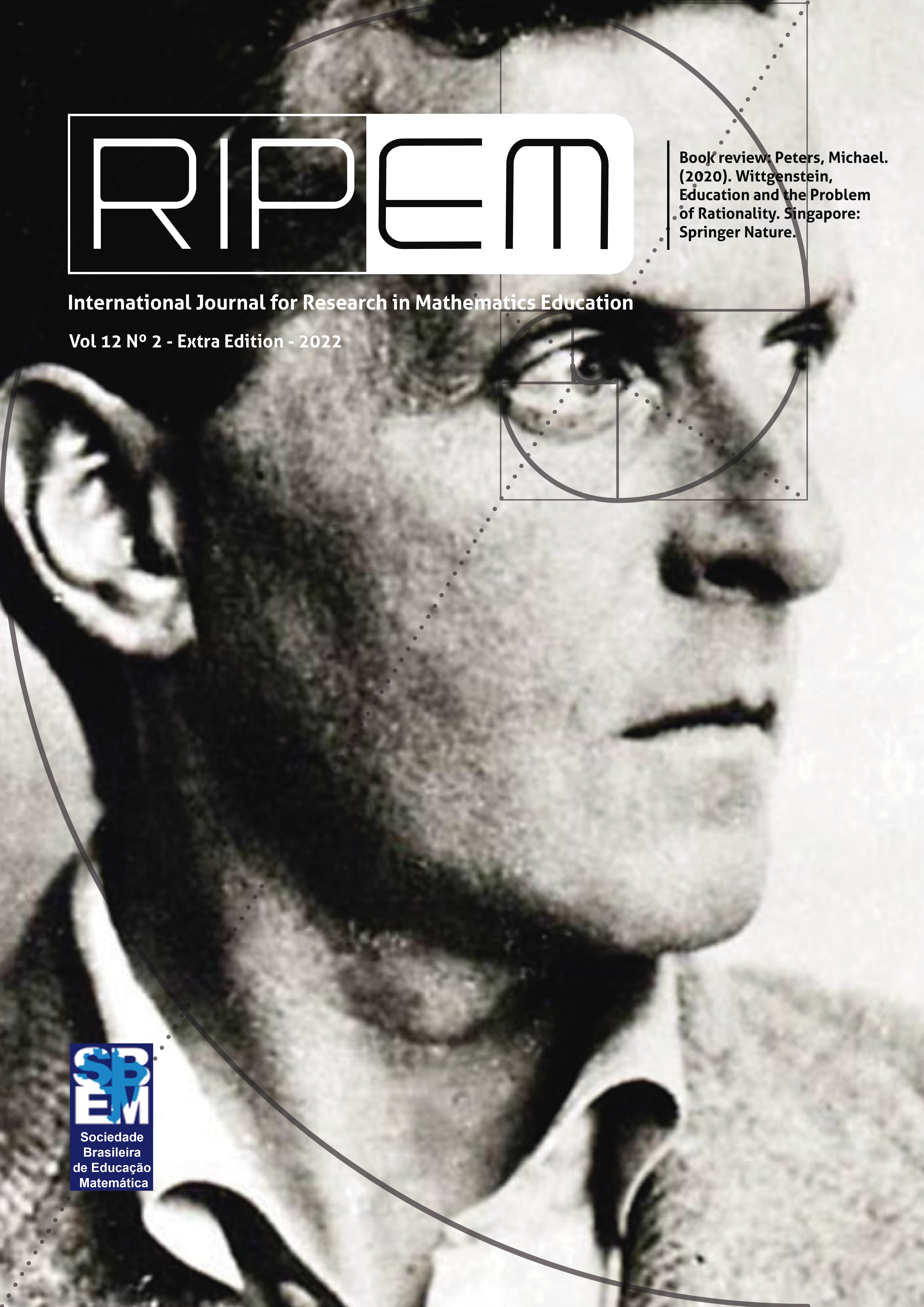Rationality is the activity of the most robust imagination (with apologies to Wallace Stevens) João José R. L. de Almeida, Antonio Miguel, Carolina Tamayo, Elizabeth Gomes Souza
DOI:
https://doi.org/10.37001/ripem.v12i2.2990Palavras-chave:
Wittgenstein, Mathematics Education, Book ReviewResumo
Michael Peters writes the text “Rationality is the activity of the most robust imagination (with apologies to Wallace Stevens): João José R. L. de Almeida, Antonio Miguel, Carolina Tamayo-Osorio, Elizabeth Gomes Souza”, in which he reveals that the review by the authors “[...] sparkles like a bright navigation star at night”. That is, Peters presents his admiration for the collective review and affirms his interest in writings of this type. He refers to the Kadiweu indigenous language of Brazil and affirms that it is a real innovation that signals the Wittgensteinian depth and one of the broad consequences of taking his thought to Really. Nevertheless, he is impressed with the writing of the article because, as he says, “[…] it is like a quartet put to music with spontaneous voices, though independent from one another, drawing out some of the consequences of my interpretation of Wittgenstein for decolonial discourse”. Peters’ admiration is revealed as he is impressed by the complexity and cultural artifact that presents itself as something more than a review, expanding the genre and focusing the content on important pedagogical issues between internal agreements and disagreements. Peters, then, dialogues with the four authors to discuss the criticisms presented.
Downloads
Referências
Davis, J. B. (2002) Gramsci, Sraffa, Wittgenstein: philosophical linkages, The European Journal of the History of Economic Thought, 9:3, 384-401.
Hughes, A. & Laura, R. (2018) The contribution of Aboriginal epistemologies to mathematics education in Australia: Exploring the silences, Educational Philosophy and Theory, 50:4, 338-348.
Lévi-Strauss, C (1942) Indian cosmetics, trans. Blanc, P . VVV 1: 33–35.
Lévi-Strauss, C (1977) Split representation in the art of Asia and America, In: Lévi-Strauss C, Structural Anthropology, trans. Jacobson, C . London: Penguin, 245–268
Lévi-Strauss, C (1992[1955]) Tristes Tropiques, trans. Weightman, J and . London: Penguin.
Monk, (1990) Ludwig Wittgenstein and The Duty of Genius. The Free Press.
Peters M. (1995) Philosophy and Education: ‘After’ Wittgenstein. In: Smeyers P. & Marshall J.D. (Ed.) Philosophy and Education: Accepting Wittgenstein’s Challenge. Philosophy and Education, vol 6. Springer, Dordrecht.
Peters, M.A. (2020). Wittgenstein/Foucault/anti-philosophy: Contingency, community, and the ethics of self-cultivation, Educational Philosophy and Theory.
Peters, M.A. & Stickney, J. (2018). Wittgenstein’s Education: 'A Picture Held Us Captive’. Spinger.
Remotti., F. (2012). From Lévi-Strauss to Wittgenstein: The Idea of ‘Imperfectionism’ in Anthropology. Diogenes, 238, 49-67.
Roller, H. F. (2018). On the Verge of Total Extinction? From Guaikurú to Kadiwéu in Nineteenth-Century Brazil, Ethnohistory (2018) 65 (4): 647–670.
Sen, A. (2003). Sraffa, Wittgenstein, and Gramsci. Journal of Economic Literature. v. 16, 1240–1255
Stewart, G. (2005). MÄori in the Science Curriculum: Developments and possibilities, Educational Philosophy and Theory, 37:6, 851-870.
Publicado
Como Citar
Edição
Seção

Este trabalho está licensiado sob uma licença Creative Commons Attribution-NonCommercial-NoDerivatives 4.0 International License.








